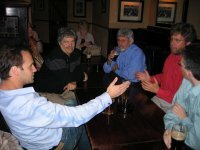 |
||||
|
|
MESSAGE FROM THE TEAM Apologies that this newsletter is reaching you a little later in the year than usual - we have been going through some very exciting times here at the Foundation. Working in the world of innovation, we have to ensure that not only our projects, but also our working methodologies are delivering world-class, cutting edge results. To this end, we have been revisiting our focus areas, challenging what we fund, why and how we fund, where we need to deliver on policy and where we need to take a stand on issues that impact education and technology. We live in a new age - technology is changing the way we do business, communicate, educate and entertain. It is not knowledge that drives societies or economies, but rather the ability to gain knowledge, and critically, what we do with that knowledge. The developed world has welcomed Web 2.0 and the associated benefits into their homes, offices and classrooms. How, in the developing context, are we equipping the youth to succeed in this new environment? The Foundation is engaging this world, strengthening our positioning, taking a stance on issues and being more controversial with practical application of our theories. We are seeking to challenge established thought and drive social innovation towards the transformation of education, and through education, society. To this end we have defined 7 broad themes in education and technology: leadership and management, communication and analysis, social networking, open source, wireless and telecommunications, IPR and content. Within each of these there are various thematic suppositions which we will try to prove/disprove and from there challenge policy at all levels. We will be publishing our findings so others can learn where we have achieved and where we have failed. Watch this space! KUSASA
Given this, we want to create a curriculum that can:
For more information, go along to www.kusasa.org COLLABORATIVE CONTENT Creating better, more accessible educational content through collaboration and peer production. A number of open content initiatives have emerged over the past few years with the aim of using the collective intelligence of educators to evolve and improve educational content. In theory, these projects can produce educational content that is more flexible, up to date and locally appropriate and is accessible to more people than centrally created and distributed materials. However, almost all of these initiatives have encountered the challenge of limited community engagement. The Shuttleworth Foundation, the IDRC's telecentre.org, the GELC and others are creating a community of practice to address this and other challenges and extend the reach of the successes. Using our existing projects as basis for discussion, members of this community will share their knowledge and experience, map challenges and opportunities and develop practical methodologies in the area of open, collaboratively produced educational content. Our aim is to encourage and facilitate the members of the education community to create and engage with knowledge, rather than merely being the recipients and conveyors of knowledge. Remember that, if you have an innovative project that challenges our new thematic approach, then please send your proposal to or fax (021) 970 1201. Visit www.shuttleworthfoundation.org for more information or contact us on (021) 970 1200. P.O.Box 4163, Durbanville 7551, South Africa Tel + 27 21 970 1200 • Fax + 27 21 970 1201 www.shuttleworthfoundation.org • Please contact to be added to or removed from this mailing list, or visit our website. This newsletter is constructed and managed with Ubuntu Media's E-Bean publishing system |
 Mark sharing his vision with Alan Kay and Guido van Rossum
Mark sharing his vision with Alan Kay and Guido van Rossum